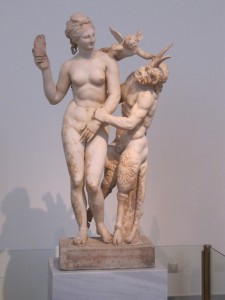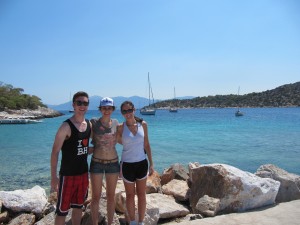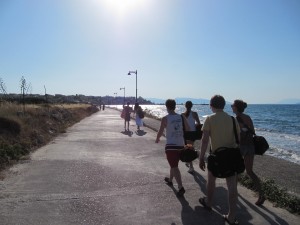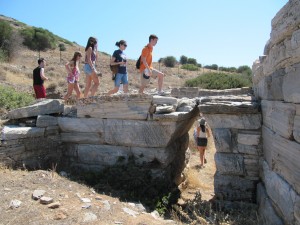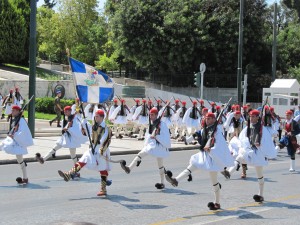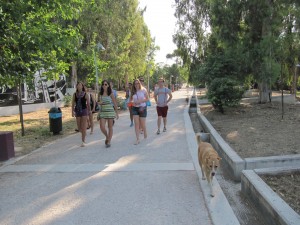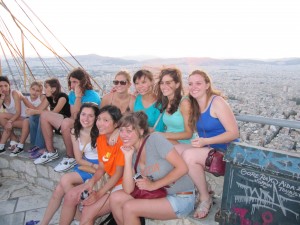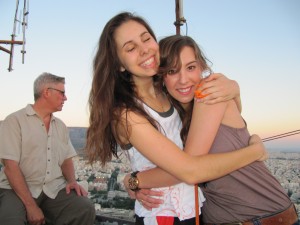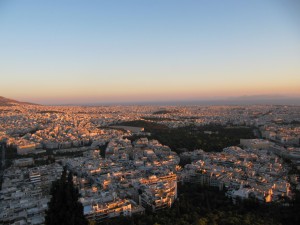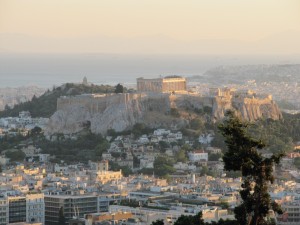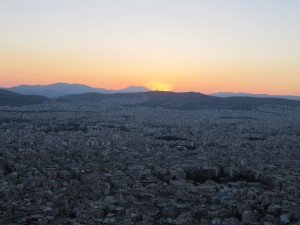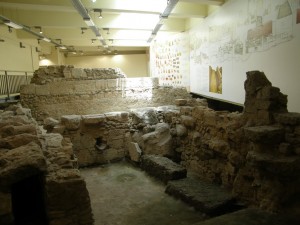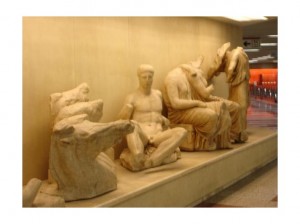With merely four full days remaining, everything has become a countdown. Four group breakfasts under the orange groves, three morning rehearsals, two taverna (traditional Greek) dinners, one day until our class presentation in the ancient theatre.
When we left Athens it didn’t feel like an end, it felt like a new beginning: new town, new performance spaces, new (extremely generous) landlords, new home. We said goodbye but it wasn’t a departure. It divided our six weeks, it was merely a continuation.
When we moved to Epidaurus it didn’t feel like the program was nearing a close, it felt like a new program entirely: new tavernas to sample, new discoveries in our monologues, new arenas to rehearse in, new understandings of the plays. Now we’re saying goodbye again, but this time it is a departure.
In four days we leave Greece. Returns will no doubt be in our future but we won’t ever return as a group or with the same purpose. Our group has become a family and we’ve grown fond of our daily ritual: each day we wake up and have a leisure breakfast together, then we rehearse for a few hours and present in the late afternoon and evening. We work on group chorus pieces, we present individual or small group scenes, and we respond to these scenes. At this point we are all working on a few pieces. Each of us has one main piece which we’ve shown in class two or three times and developed along the way. These main pieces have developed tremendously; my classmates are all very talented, but I’m constantly floored by the work they all put into their pieces to strengthen them, exceeding expectations with each new draft. Six weeks spent studying these plays intensely and extensively has been quite a journey for us all as we make them come to life.
About eight weeks ago we were told to read a dozen plays to prepare ourselves for what was to come. To be honest I found the plays a bit intimidating and even foreign at times. It was difficult to imagine putting certain scenes on their feet, to connect to some of the language and characters, and to understand the context in which these plays were written and performed. But now we can imagine, we have connected, we do understand, and that’s special. Now we’ve read them, reread them, memorized snippets, staged them, and perhaps the most importantly, we’ve been able to contextualize them by rehearsing at the sites where they were first staged and touring the towns in which they were based.
These texts, being 2,500 years old, might not be the easiest to access right away, but through trial and error, dedication, focus, and time, we’ve each taken a monologue or scene apart and sewn it back together with our own nuanced understanding of the character, situation, and play at large. Besides my classmates general awesomeness, I think the main reason we’ve been able to sink our teeth so deeply in these texts is time.
For five weeks we didn’t have to juggle labs, finals, dance recitals, problem sets, a capella arch sings, rehearsals, college council meetings, and the reading load of three or four other classes.
For five weeks, we have focused solely on the forty or so extant Greek comedies and tragedies and the history surrounding them.
For five weeks we were instructed in and outside the classroom by two brilliant professors who master the balance of theatre’s academic and practical sides and who are ever-encouraging us to push ourselves and our understanding of the plays.
For five weeks we’ve seen our classmates become Medea, Cassandra, Dionysus, Antigone, Clytemnestra, Oedipus, and others. We’ve made Agamemnon’s watchman a slam poet, Tecmessa a Spanish slave, Menelaus a British explorer, Helen a real housewife of Argos, the furies a 90s girl band, Lysistrata characters shadow puppets among many, many, many other original interpretations. We’ve adapted the story of Helen and Menelaus twice–both in ways untried and imaginative, Aristophanes’ Frogs to provide commentary on the 2012 presidential election, Prometheus and Io’s story to make it a modern radio drama, and Aristophanes’ Knights to roast everyone in our group.
For five weeks we’ve felt Dionysus enter our classroom.
For five weeks we’ve waged agons (competitions) over matters big and small, just as the Greeks did.
For five weeks we’ve immersed ourself in Greek culture, ancient and modern, which has greatly improved our understanding of how, why, and where theatre began.
For five weeks we’ve seen roughly ten shows in three different languages and learned from them all.
For five weeks we’ve spoken to and worked with Greek actors, directors, and professors all of whom stress how theatre was a part of society in a way we can no longer fathom. How the theatre was a place for everyone — men’s attendance was mandatory — and a place where society could be criticized, where stories that moved masses could be shared, where mutual experiences were had and appreciated by all.
For five weeks we’ve wondered why this is no longer the case.
And now we have four days.
Fortunately, I’m certain that the lessons, the thoughts, the progress, the wondering, the curiosity, and the discoveries will continue far beyond these four days. We’ll make the most of these remaining four and carry what we’ve learned back to Princeton and far beyond.

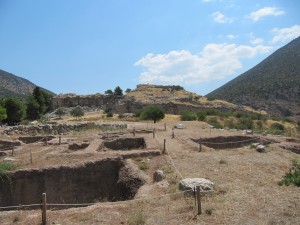









 Monday’s sunrise around 6:45am. How breathtaking is that?!
Monday’s sunrise around 6:45am. How breathtaking is that?!

